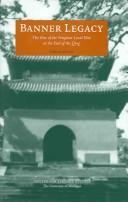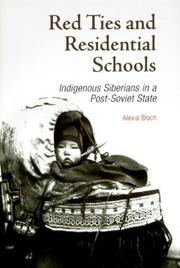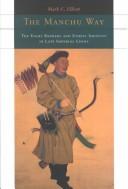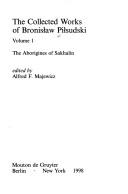| Listing 1 - 10 of 15 | << page >> |
Sort by
|

ISBN: 0892641657 9781938937002 Year: 2004 Publisher: Ann Arbor Center for Chinese Studies, the University of Michigan
Abstract | Keywords | Export | Availability | Bookmark
 Loading...
Loading...Choose an application
- Reference Manager
- EndNote
- RefWorks (Direct export to RefWorks)
S04/0680 --- China: History--Qing: general: 1644 - 1912 --- Manchus --- History. --- Manchu (Manchurian people) --- Ethnology --- Tatars --- Tungusic peoples --- History --- China --- Manchuria (China) --- S11/0708 --- China: Social sciences--Elite
Book

ISBN: 9783110205619 9783110221053 3110221055 Year: 2011 Publisher: Berlin De Gruyter Mouton
Abstract | Keywords | Export | Availability | Bookmark
 Loading...
Loading...Choose an application
- Reference Manager
- EndNote
- RefWorks (Direct export to RefWorks)
Volume 4 includes unique records of Orok (Uilta), a Tungusic language (dictionaries, texts, grammatical comments) noted down by Pilsudski directly from native informants at the beginning of the 20th century on Sakhalin. The original source material is identified with the help of - and confronted against - all the existing contemporary dictionaries with the assistance of leading specialists in the field (the Novosibirsk Avrorin group, also called the school of Manchu-Tungusologists). Abundant comparative data are quoted. All necessary introductory information and commentaries of ethnographic, h
Ethnology. Cultural anthropology --- Russian language --- Siberia --- Tungus-Manchu languages. --- Tungusic peoples --- Social life and customs. --- Endangered Languages. --- Language Contact. --- Non-Indo-European Languages.
Book
ISBN: 9780824834456 Year: 2011 Publisher: Honolulu University of Hawaii press
Abstract | Keywords | Export | Availability | Bookmark
 Loading...
Loading...Choose an application
- Reference Manager
- EndNote
- RefWorks (Direct export to RefWorks)
Manchus --- Ethnic identity. --- History --- Manchuria (China) --- S22/0500 --- S22/0520 --- Manchu (Manchurian people) --- Ethnology --- Tatars --- Tungusic peoples --- Ethnic identity --- North-eastern provinces (Manchuria)--History: general and before 1931 --- North-eastern provinces (Manchuria)--History: since 1945
Periodical
ISSN: 16000439 Year: 1923 Publisher: Lugduni Batavorum, Oslo : Oslo : E.J. Brill, Havniæ [i.e. Copenhagen] : Munskgaard Novus Hermes
Abstract | Keywords | Export | Availability | Bookmark
 Loading...
Loading...Choose an application
- Reference Manager
- EndNote
- RefWorks (Direct export to RefWorks)
Oriental philology --- Oriental antiquities --- Philologie orientale --- Antiquités orientales --- 15.75 history of Asia. --- 18.00 languages in general. --- Oriental antiquities. --- Oriental philology. --- Oriëntalistiek. --- Antiquities --- Philology, Oriental --- Turkic peoples $x Philosophy $v Periodicals. --- Philosophy, Mongolian $v Periodicals. --- Tungusic peoples $x Philosophy $v Periodicals. --- Philosophy, Asian $v Periodicals. --- Philosophy, Chinese $v Periodicals. --- Philosophy, Tibetan $v Periodicals. --- Indian philosophy $v Periodicals. --- Philosophy, Iranian $v Periodicals. --- Turkic peoples --- Philosophy, Mongolian --- Tungusic peoples --- Philosophy, Asian --- Philosophy, Chinese --- Philosophy, Tibetan --- Indian philosophy --- Philosophy, Iranian --- Philosophy --- Mongolian philosophy --- Altaic peoples --- Ethnology --- Asian philosophy --- Oriental philosophy --- Philosophy, Oriental --- Iranian philosophy --- Philosophy, Persian --- Indians --- Philosophy, Indian --- Tibetan philosophy --- Middle East --- Study and teaching
Book
ISBN: 0835111512 Year: 1983 Publisher: Beijing Foreign languages press
Abstract | Keywords | Export | Availability | Bookmark
 Loading...
Loading...Choose an application
- Reference Manager
- EndNote
- RefWorks (Direct export to RefWorks)
Ethnology --- -Oroqen (Chinese people) --- Elunchun (Chinese people) --- Olunchun (Chinese people) --- Orochon (Chinese people) --- Oronchon (Chinese people) --- Ulunchun (Chinese people) --- Tungusic peoples --- Cultural anthropology --- Ethnography --- Races of man --- Social anthropology --- Anthropology --- Human beings --- China --- Ethnic relations. --- Oroqen (Chinese people) --- Nomads --- Heilongjiang Cheng (Chine)
Book
ISBN: 9150600648 Year: 1976 Publisher: Uppsala Tofters
Abstract | Keywords | Export | Availability | Bookmark
 Loading...
Loading...Choose an application
- Reference Manager
- EndNote
- RefWorks (Direct export to RefWorks)
Bears --- -Evenki (Asian people) --- Avanki (Asian people) --- Avankil (Asian people) --- Chapogir (Asian people) --- Ewenki (Asian people) --- Khamnigan (Asian people) --- O-wen-kʻo (Tribe) --- Owenke (Asian people) --- Owenko (Asian people) --- Tungus (Asian people) --- Tunguses --- Arctic peoples --- Ethnology --- Tungusic peoples --- Ursidae --- Carnivora --- Religious aspects --- Rites and ceremonies. --- Evenki (Asian people) --- Religious aspects. --- Rites and ceremonies
Book
ISBN: 9004254234 9789004254237 9789004233065 9004233067 Year: 2013 Publisher: Leiden Boston Global Oriental
Abstract | Keywords | Export | Availability | Bookmark
 Loading...
Loading...Choose an application
- Reference Manager
- EndNote
- RefWorks (Direct export to RefWorks)
Evenki are modern hunter-gatherers who live in Central and Eastern Siberia, Russian Federation. They are known to scholarship for their animistic worldview, and because the word ‘shaman’ has been borrowed from their language. Despite such recognition contemporary Evenki everyday life rarely appears as a subject for anthropological monographs, mainly because access to Evenki communities for the purpose of extended fieldwork has only recently become possible. In this original study of the Evenki the authors describe a variety of events and situations they observed during fieldwork, and through these experiences document different strategies that Evenki use to retain their ethos as hunter-gatherers even in circumstances when hunting is prohibited. The authors adopt the vocabulary of cybernetics, proposed by anthropologist Gregory Bateson, in order to underline the circuit logic of events that happen in Evenki land. Culture Contact in Evenki Land , therefore, will be welcomed by social anthropologists in general and specialists of Siberian and Inner Asian studies (Manchu-Tungus peoples) and hunter-gatherer peoples in particular, as well as those interested in the cybernetic approach.
Evenki (Asian people) --- SOCIAL SCIENCE / Anthropology / Cultural. --- SOCIAL SCIENCE / Discrimination & Race Relations. --- SOCIAL SCIENCE / Ethnic Studies / General. --- SOCIAL SCIENCE / Minority Studies. --- Avanki (Asian people) --- Avankil (Asian people) --- Chapogir (Asian people) --- Ewenki (Asian people) --- Khamnigan (Asian people) --- O-wen-kʻo (Tribe) --- Owenke (Asian people) --- Owenko (Asian people) --- Tungus (Asian people) --- Tunguses --- Arctic peoples --- Ethnology --- Tungusic peoples --- Baikal, Lake, Region (Russia) --- Social life and customs.

ISBN: 9780812237597 0812237595 0812293622 Year: 2004 Publisher: Philadelphia, Pa. : University of Pennsylvania Press,
Abstract | Keywords | Export | Availability | Bookmark
 Loading...
Loading...Choose an application
- Reference Manager
- EndNote
- RefWorks (Direct export to RefWorks)
In this book Alexia Bloch examines the experiences of a community of Evenki, an indigenous group in central Siberia, to consider the place of residential schooling inidentity politics in contemporary Russia. Residential schools established in the 1920s brought Siberians under the purview of the Soviet state, and Bloch demonstrates how in the post-Soviet era, a time of jarring social change, these schools continue to embody the salience of Soviet cultural practices and the spirit of belonging to a collective. She explores how Evenk intellectuals are endowing residential schools with new symbolic power and turning them into a locus for political mobilization.In contrast to the binary model of oppressed/oppressor underlying many accounts of state/indigenous relations, Bloch's work provides a complex picture of the experiences of Siberians in Soviet and post-Soviet society. Bloch's research, conducted in a central Siberian town during the 1990s, is ethnographically grounded in life stories recorded with Evenk women; surveys of households navigating histories of collectivization and recent, rampant privatization; and in residential schools and in museums, both central to Evenk identity politics.While considering how residential schools once targeted marginalized reindeer herders, especially young girls, for socialization and assimilation, Bloch reveals how class, region, and gendered experience currently influence perspectives on residential schooling. The analysis centers on the ways vehicles of the Soviet state have been reworked and still sometimes embraced by members of an indigenous community as they forge new identities and allegiances in the post-Soviet era.
Evenki (Asian people) --- Ethnology --- Evenk (Peuple d'Asie) --- Anthropologie sociale et culturelle --- Education --- Avanki (Asian people) --- Avankil (Asian people) --- Chapogir (Asian people) --- Ewenki (Asian people) --- Khamnigan (Asian people) --- O-wen-kʻo (Tribe) --- Owenke (Asian people) --- Owenko (Asian people) --- Tungus (Asian people) --- Tunguses --- Arctic peoples --- Tungusic peoples --- Cultural anthropology --- Ethnography --- Races of man --- Social anthropology --- Anthropology --- Human beings --- History. --- Anthropology. --- Education. --- Folklore. --- Linguistics.

ISBN: 9780804746847 0804736065 Year: 2001 Publisher: Stanford (Calif.): Stanford university press
Abstract | Keywords | Export | Availability | Bookmark
 Loading...
Loading...Choose an application
- Reference Manager
- EndNote
- RefWorks (Direct export to RefWorks)
Manchus --- Mandchous --- Ethnic identity --- History --- Identité ethnique --- Histoire --- China --- Chine --- S22/0500 --- S04/0690 --- S04/0691 --- S06/0205 --- -Manchus --- -Manchu (Manchurian people) --- Ethnology --- Tatars --- Tungusic peoples --- North-eastern provinces (Manchuria)--History: general and before 1931 --- China: History--Qing: 1644 - 1840 --- China: History--The conquest of 1644 --- China: Politics and government--Government and political institutions: Qing --- -History --- -Ethnic identity --- -S22/0500 --- -North-eastern provinces (Manchuria)--History: general and before 1931 --- Identité ethnique --- Manchu (Manchurian people)

ISBN: 311010928X 3110161184 3110176149 9783110221053 3110221055 Year: 2004 Publisher: Berlin Mouton de Gruyter
Abstract | Keywords | Export | Availability | Bookmark
 Loading...
Loading...Choose an application
- Reference Manager
- EndNote
- RefWorks (Direct export to RefWorks)
Volume 4 includes unique records of Orok (Uilta), a Tungusic language (dictionaries, texts, grammatical comments) noted down by Pilsudski directly from native informants at the beginning of the 20th century on Sakhalin. The original source material is identified with the help of - and confronted against - all the existing contemporary dictionaries with the assistance of leading specialists in the field (the Novosibirsk Avrorin group, also called the school of Manchu-Tungusologists). Abundant comparative data are quoted. All necessary introductory information and commentaries of ethnographic, h
Ethnology. Cultural anthropology --- Russian language --- Russia --- Tungus-Manchu languages. --- Tungusic peoples --- Altaic peoples --- Ethnology --- Manchu languages --- Manchu-Tungus languages --- Tungus languages --- Tungusic languages --- Altaic languages --- Social life and customs. --- J5091 --- J4207 --- J4190.80 --- J4190.85 --- Japan: Language -- minority languages in Japan -- Ainu --- Japan: Sociology and anthropology -- communities -- native ethnicity and race --- Japan: Sociology and anthropology -- local communities and culture -- Hokkaidō (Ezo) --- Japan: Sociology and anthropology -- local communities and culture -- northern territories --- Endangered Languages. --- Language Contact. --- Non-Indo-European Languages.
| Listing 1 - 10 of 15 | << page >> |
Sort by
|

 Search
Search Feedback
Feedback About UniCat
About UniCat  Help
Help News
News